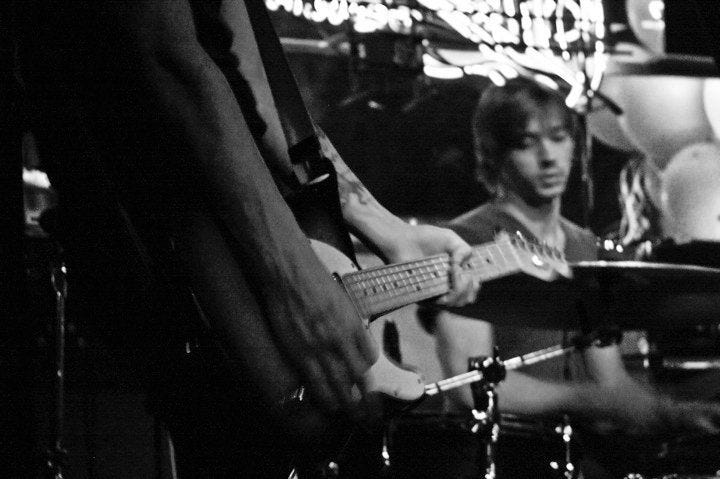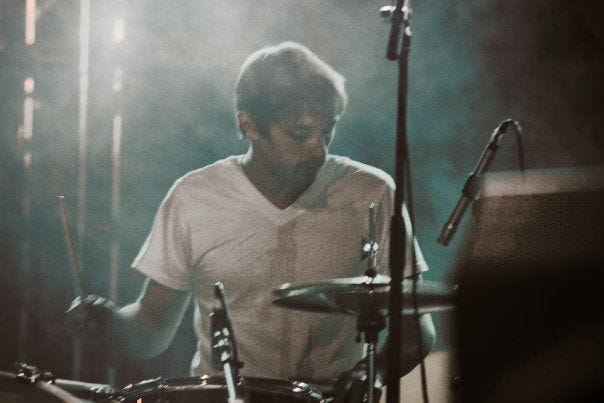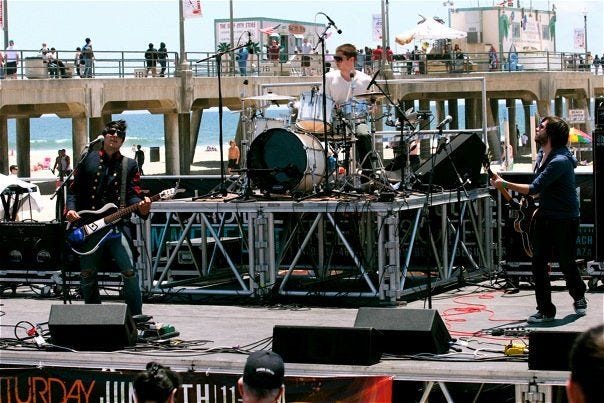Drumming for Jesus
Nathan Ryan was in the Christian Coldplay. Here's what he learned about faith.
My friend Nathan Ryan, who wrote way back in April about the good that could come of the pandemic, is the CEO of a boutique consulting firm and the co-founder of Good Politics, a convening based on the notion that people ought to be able to have conversations with their elected officials. He’s also one of the most solid citizens I know and a man of sincere faith. A while ago, he let it slip that he played drums in the Christian contemporary rock version of Coldplay, and I’ve been after him to write about it ever since. When he returned from a trip back home to Southern California where this story starts, he sat down to write the whole story about his journey of faith. You’re in for a treat.

by Nathan Ryan
Growing up, I would often come home from school, pretend to do homework for a little bit, play drums and then somehow end up in my parents’ room talking with mom. She usually sat at a little desk in their room, writing letters.
Over the course of a couple hours, as the rest of my family would trickle in. My parents’ bedroom wasn’t very big, but we all fit, lounging on their bed, the floor, or bringing chairs from the kitchen table.
Conversation usually centered on something happening at school, at the church my dad pastors, or something in the Evangelical community in Santa Clarita. We were fairly involved in the Southern Baptist Convention in Southern California, an arm of the Southern Baptist Association, which is how I ended up as playing drums for a touring Christian rock band at the age of 15.
Church camps are cash cows for bands. You have a captive audience for up to a week, and you can sell CDs, T-shirts, hats, stickers, and everything else. They’re also a good proving ground for bands that might want to make the jump to the professional Contemporary Christian Music (CCM), or even the—gasp!—secular music scene. I’m sure this is still true today but, at the time, almost every secular band had a Christian equivalent. At Christian music stores, you’d often see tags next to CDs that said things like, “If you like Nirvana’s ‘Nevermind,’ you’ll love dcTalk’s ‘Jesus Freak’.”
As a young drummer, my dream was to tour with a CCM band. To make that happen, I had to practice enough to impress a church camp band. So I did.
In my seventh grade year, at summer camp, after badgering the lead singer and bassist for Riverside-based band called Moi, I did a drum solo at a camp talent show. A little while later, I got the call asking if I’d cover for their normal tour drummer when the band played at my dad’s church.
I was only 14, but even I could tell that this was an easy way to try me out with little consequence. If I did terribly, I was still the pastor’s son, and they built some goodwill with the church by asking me to play. If I did well, then they had another drummer they could ask to fill in for their normal drummers when needed. Presumably, at my age, I was also much cheaper, which couldn’t hurt for a band that lived off a small stipend from the church and merch sales.
The morning I sat in as drummer for Moi at dad’s church went well, and I soon found myself lugging gear to gigs all over Southern California. Most of these were at churches, but, considering its reputation as a bastion of godless liberalism, it might surprise you that California has more megachurches (i.e. churches with more than 2,000 attendees) than any other state in the U.S.

Many of these were so flush with cash that they built out separate venues for community-building and outreach. Some had coffee shops, and many owned or rented big, professional stages to put on what were essentially local festivals.
By the time I was sixteen I was on the road four to five days a week, especially weekends, touring much of the country. As my schedule only continued to get busier, my parents switched me to a one-of-a-kind public school during my sophomore year that only required me to be in-person one day a week to take tests and be quizzed by a teacher. Otherwise, I was on the road, playing shows, blasting punk rock on my Walkman, studying in the back seat of a 15-passenger van.
The band had some modest success, and our music evolved from Latin-inspired, acoustic funk-rock, to a kind of intricate, stadium rock vibe. We became the Christian Coldplay fronted by a bilingual Jeff Buckley. This evolution gave us the opportunity to graduate from playing church services and church camps to the CCM festival circuit. As a sixteen-year-old, this meant spending time at camps full of kids my own age, pretending I was older, taking pictures and signing autographs.
It also meant a great deal of exposure to many different expressions of Christianity. Growing up Southern Baptist, that was all I knew, really, until I went out on the road. Touring meant meeting Christians that disagreed with the Iraq War, Christians that allowed women to preach, Christians that affirmed the LGBTQIA+ community, Christians that spoke Mandarin and Spanish and Swahili. It also meant meeting Christians that believed the End Times were imminent, that Jesus was going to come back very soon—that the Left Behind book series was basically non-fiction.
I was exposed to Christians who believed in love and service of their neighbor as an end to itself, and to Christians who believed in fire and brimstone as a way to retain power; to Christians who knew they were broken, were open about their brokenness, and therefore were curious about other peoples’ experiences, and to Christians who were judgmental, coercive, and often hypocritical. (Judgment, coercion, and hypocrisy create an incredibly potent cocktail for those who want to feel powerful.)
As the band got more and more well-known, we started branching outside of the church scene. At first it was hush-hush. We didn’t want pastors at Calvary Chapel knowing we were going straight from leading worship to playing a rock show at the Whisky A-Go-Go on Sunset Boulevard in Hollywood.
One Sunday afternoon when I was younger, before I started touring with Moi, I distinctly remember going to the Christian bookstore with my family. On this particular Sunday, I decided to buy the CCM debut record from a new Christian electronic hard rock band called Skillet. I had seen their music video for a single called, “Kill me, heal me,” and it was like nothing I’d ever heard before (like a Christian finger eleven). Here’s a sampling of the lyrics for their new single:
How can I scream when the pain is
Such a release I get the courage
To pick up the nails 'cause it's killing time
My mother was not a fan. On the drive home, she told my family she didn’t like Skillet—not because she didn’t like their style of music, but because, well, she didn’t think they were Christian. How could Christians write lyrics that were so violent and dark? She was convinced they were trying to scam the Contemporary Christian Music scene, make a bunch of money, and then turn on them by ditching the CCM market for the secular market. If she only knew.
This is why we were so secretive when we started playing outside the CCM market. In 2008, you had to at least pretend you were a Christian to have any kind of leadership position in Christian circles. We didn’t want people to think we were charlatans, just looking to make a buck off the church. We weren’t! So, eventually, when we couldn’t afford not to promote these “secular” gigs anymore, we had to pull from the CCM PR playbook and say we were playing venues like the Whisky because we wanted to be a witness for Jesus outside the church.
That wasn’t entirely disingenuous at the time, but it was also not what we were doing.
We weren’t “witnessing,” or “evangelizing.” We weren’t afraid to talk about our faith if the opportunity presented itself but, when we played clubs, we were just a rock band. We intentionally left the more “Christian” parts of our discography off the march table. Through these gigs I got my first real taste of what it was like to hang out with non-Christians for any extended period of time. I was seventeen.
At first, I was offended by language and certain topics of conversation. Let’s just say jokes told by church sound engineers are quite different than the ones told by the folks running sound at The Roxy. I braced for humiliation as word slowly got out among club audiences that we were a “Christian band.” The humiliation and “persecution” never came.
They liked our music. We had created something. They wanted to hear us play it. They were interested in our personal stories, wanted to know why we believed in Jesus. People were curious about me and I was curious about them. It was not what I expected. We weren’t sitting in green rooms where bands like Motley Crüe did a lot of drugs.

Over time, I found myself enjoying these secular gigs more than the church gigs, mostly because I felt like I could actually be myself. I could have faith and doubt—and I could voice both of those things without feeling like I needed to use insider Evangelical language. It also meant that I could enjoy the art we were making for its own sake. I didn’t need to qualify it.
I met my wife, Amanda, in high school. We fell in love on a youth group trip to Mexico, got married in 2010. When the market crashed in 2008, I had an opportunity to go work as a graphic designer for Disney in Glendale, CA, but still tried to keep up with music, taking gigs on weekends. But eventually, as much as I loved it, after Amanda and I got married, I just couldn’t justify even four nights a month for $125 per gig. I had to quit.
Since then my faith has evolved. My love for people has deepened. I still love Jesus, and because I love Jesus, I don’t obsess about the End Times—that’s above my pay grade. I obsess about how to make the world we live in today more fair, more fun, more just. I think that’s what Jesus would do.
In August, Amanda and I drove back to California to shelter in place with my family for a couple of weeks in the middle of the pandemic. We just needed a change of scenery. One afternoon, after I finished a conference call, I walked into my parents’ room and sat down on the bed, mom sitting at her desk, writing emails to family. Slowly, the rest of the family, including Amanda, came in and found a place to sit.
That week, fires raged in California, hurricanes in Texas. Coronavirus had been left to the states, the president continued to attack the integrity of our elections, and QAnon was infiltrating the hearts and minds of Evangelical churches all over the country.
My dad sighed and said, “The world is crazy, man. I know so many people who say they’re having visions right now, that End Times prophecy is being fulfilled.”
I looked down, wondering what to do with my hands. I felt thirteen again. I love my parents. I am so proud of my family. But I refuse to accept this framing.
“What if it’s up to us?” I asked. “What if it’s up to us to show people we love them, not by telling them the end is nigh—especially when we don’t know if it is or not? What if it’s up to us to work alongside people and try to find a better way?”
I learned a lot as a drummer in the Contemporary Christian Music scene. But I think the most important thing I learned is that there are entire industries that profit from the culture wars and we—all of us—are the victims. The Contemporary Christian Market is full of singers and bands that do drugs as frequently as any secular band, bands that drink and party and sleep around, but get up on stage night after night and praise the name of Jesus.
I remember one such conversation after a festival gig in Northern California about a very influential worship leader based in Texas who was apparently drunk just about every night on tour—while he was on stage. He suffered from massive bouts of depression and often took it out on his wife because it was uncouth to seek help. Everybody knew and nobody said anything. He is now divorced and actively releasing worship music today.
Like Jerry Falwell Jr., these are known secrets in elite Christian circles, and I doubt it surprises anybody given America’s current president. But it’s profitable to keep those secrets and push the lie that it’s secular, liberal elites who are ruining Americas family and societal structures.
Culture wars don’t help anybody. They don’t “save” people. They trap good people in unhealthy religious systems that stifle their growth.

What do you think of today's email? I'd love to hear your thoughts, questions and feedback. I might even put ‘em in the newsletter if I don’t steal it outright.
Enjoying this newsletter? Forward to a friend! They can sign up here. Unless of course you were forwarded this email, in which case you should…
The latest Real Clear Politics polling average has Trump’s lead in Texas at 3.5%. Texas is a swing state. Let’s act like it.
Want a way to send gifts and support local restaurants? Goldbelly’s got you hooked up. Sending friends kolaches has become my new favorite thing.
I used this to order scotch delivered right to my door. Recommend.
Thanks to Noom I am down to my college weight, and haven’t had to cut out any foods. I hit my goal weight before Memorial Day and have stayed within a few pounds either way ever since. This is easy. Noom is an app that uses psychology, calorie counting, and measuring activity to change your behavior and the way you think about food. I’m stronger and healthier than I’ve been in years. Click on the blue box to get 20% off. Seriously, this works.
Headspace is a meditation app. I’ve used it for a couple years and am absolutely shocked at how much it’s taught me about managing my inner life. Try it free for a couple weeks. Don’t worry if you’ve never done it before. They talk you through it.
Want a way to send gifts and support local restaurants? Goldbelly’s got you hooked up.
I now offer personal career coaching sessions through Need Hop.
The extent of my political work this election cycle is as the treasurer to a Super PAC with one mission: helping Joe Biden win Texas. If you want to help, here’s how:
If this newsletter is of some value to you, consider donating. Honestly, I’m not doing this for the money. I’m writing this newsletter for myself, and for you. And a lot of you are contributing with letters and by suggesting articles for me to post. But some of you have asked for a way to donate money, so I’m posting my Venmo and PayPal information here. I promise to waste every cent you give me on having fun, because writing this newsletter for you is some of the most fun I’ve had. Venmo me at @Jason-Stanford-1, or use this PayPal link.


